AWS vs Microsoft Azure. What is Better to choose
Posted on by ChandanIn this digital Era , the days are gone when we were using physical devices for example external hard drive pen drive etc. We should thankful to the cloud data storage services. Two of the most big fishes in this market are Microsoft Azure and Amazon Web Services (AWS). We will compare both of the two big giants in the market and see what is better to choose for our needs.
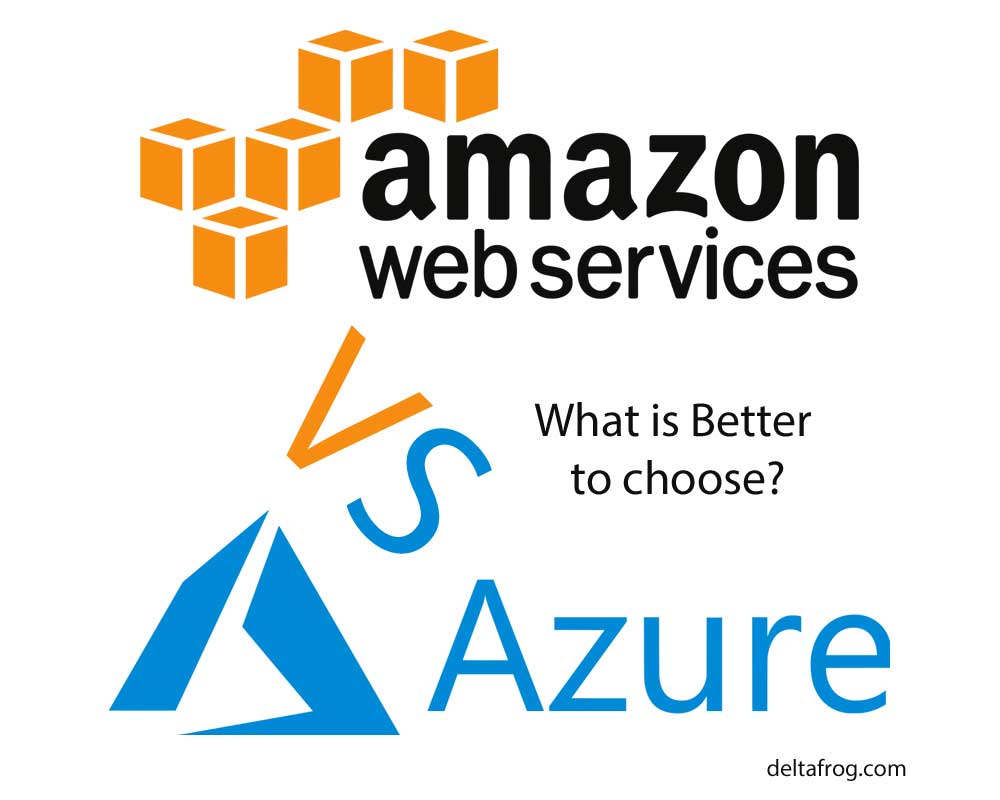
First of all, lets take a brief look at both of these cloud services. Starting with Amazon web services, according the their official website, AWS is a part of amazon.com. It provide on-demand services on cloud platform to different companies, professional individuals and government as well. The users need to subscribe to their services after paying some amount to them. Similarly Microsoft Azure is also a cloud platform created by Microsoft company. Its used to build, deploy, test and manage applications and services on the global data centers of Microsoft.
Histroy and establishment of AWS and Azure
Launched in 2006, AWS has more experience in cloud computing market than everyone in market. AWS has successfully met the on-demand needs of Enterprises. On the other hand, launched in 2010, Azure is a very good competitor of AWS in the market. It is quite a competent cloud computing platform for businesses of different needs.
But, the questions remains that, what is better to choose from these two platforms. How these two are different to each other on various factors , needs and expectations.
Comparing AWS vs Azure on availability and market share factors:
- Lets start with the first factor, that is availability zones. As we already know that, AWS is older that all the platforms present today. So, it is available in different zones worldwide. Also, Azure has many zones worldwide. But the difference present in the number of zones for both the service providers. AWS has 63 available zones around the globe and more coming and on the way. Where as Azure has 56 availability zones and more on the way.
- Lets move to the next factor that is the market shares. AWS has 40% of the global market shares today. Where as, Azure covers 30% of market worldwide. There is a very interesting point that, there are none cloud service providers that shares 15% of the market. So, this makes AWS as the first option choose because of its popularity and experience. Furthermore, if we go through the google trends, we can see that AWS is 30% more popular than Azure. People has shown more interest in it than Azure in the past 12 months.
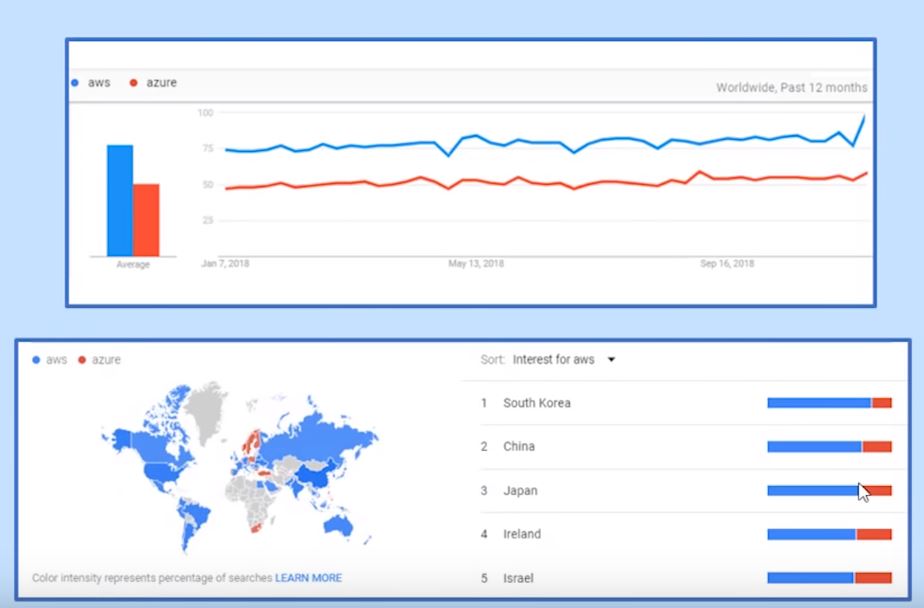 According to search results in USA, Amazon web services in more interesting than Microsoft cloud services.
According to search results in USA, Amazon web services in more interesting than Microsoft cloud services.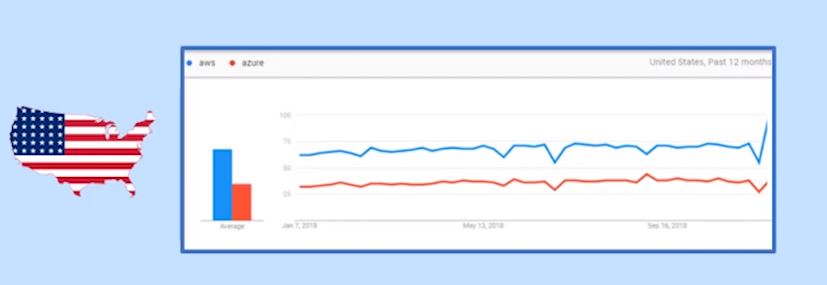 In India as well there is more interest for AWS than Azure.
In India as well there is more interest for AWS than Azure.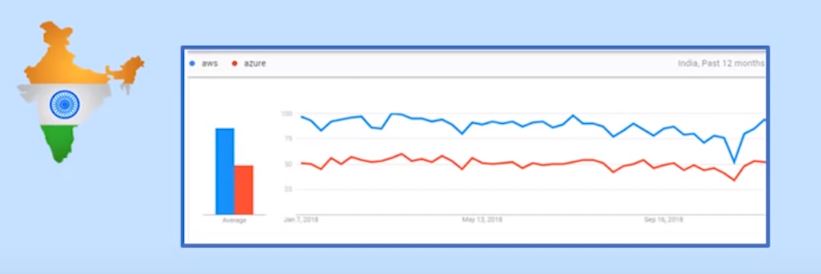 Comparing other cloud vendors ( Google, IBM, Rackspace ) with these two we can see that no one is close with these two.
Comparing other cloud vendors ( Google, IBM, Rackspace ) with these two we can see that no one is close with these two.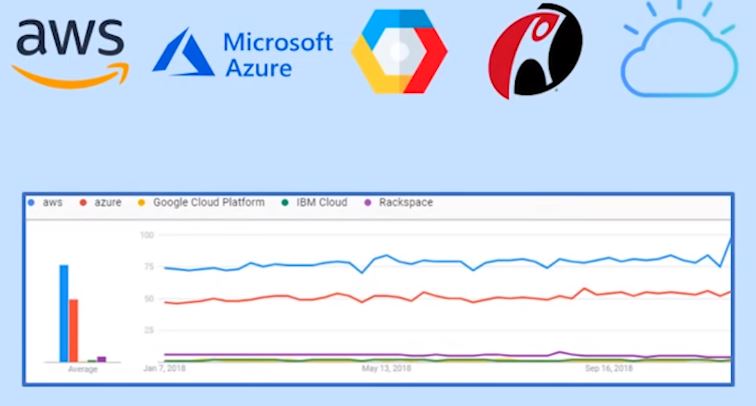
- There is one more interesting fact, According to Forbes, Azure has passed Amazon web services in terms of revenue from their services . That’s approximately , 6 Billoin US Dollars to 5.5 Billion Dollars. In conclusion, we can place AWS in the first place in terms of market shares. Because it has a bigger community, trust and support across their clients. This is the reason why, it has many high profile clients like, Netflix, Airbnb, Unilever, BMW, Samsung, MI, Zynga etc. Azure is also not far behind. It has also many good companies as their clients. For example, Johnson Controls, Polycom, Abobe, Hp, Fujitsu, Honeywell, Apple etc.
Service factors
- Lets move forward in comparison and see what are the service offerings by both of them. The services to compare both of them comes under the following domains:
Compute
Database
Storage
Security
Networking
Monitoring
Development
Internet of things
In those domains some of the services covered by AWS are EC2, RWS, S3, IAM, VPC, CloudWatch, Cloud9, IotCore and many more. Similarly Azure covers the services like Virtual Machine, SQL Database, Blog Storage, Active Directory, Virtual Network, Monitor, Visual Studio, IOT Hub and many more. - The other factor is the integration of these services with open source tools. Amazon has very good relations with the open source communities that leads to more connectivity with the open source tools. Some of the AWS open source tools are Jenkins, Docker, Ansible, Github and friendly nature with linux servers. In case of Azure, It offers native integrations for windows development tools such as VBS, SQL Database, Active Directory. We all know when it comes to open source, Microsoft hasn’t always embraced this model, but recently they have been catching up with it. So, the organizations now can run Redhat enterprise Linux edition and Hadoop clusters in Azure.
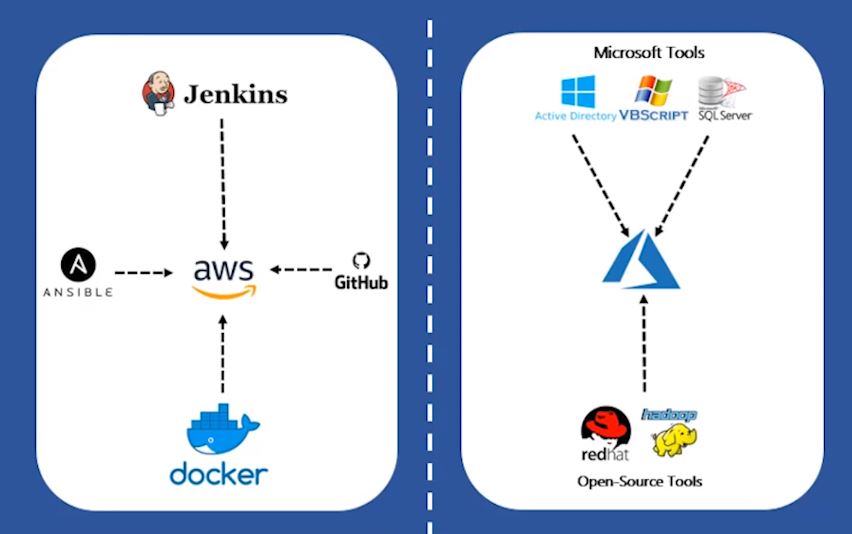
Pricing factors
- Lets check their pricing models. In case of AWS, a very basic instance which includes 2 virtual CPUs and 8 GB RAM will cost you around 0.0928 USD per hour. In case of Azure, it will cost you around 0.096 USD per hour. Also the largest instance offered by AWS is 256 GB RAM along with 64 virtual CPUs which cost you around 3.20 USD per hour. Similarly, Azure offeres the same capacity of RAM and virtual CPUs but has high price around 6.76 USD per hour.So it means Azure is very expensive in terms of high usage.
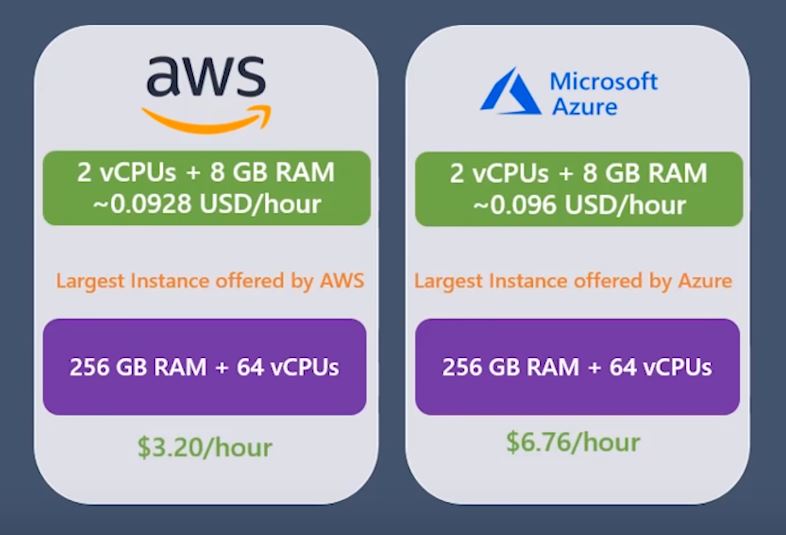
Different job roles after learning AWS and Azure
This is a very popular and frequent question asked by the students of cloud platform.
AWS job roles: There are 3 jobs roles basically.
- awsSYSOPS
- awsARCHITECT
- awsDEVELOPER
If you are quite familiar with the admin roles or you come from an admin background. Then, you can choose a job role as SYSOPS. Here they have to perform several admin roles like create automating and repeating deployments for networks and systems using features and tools.These tolls are related to configurations and deployments.
Developer is a role for those students who come from development background. Here they will perform operations on services and developing SAAS-based applications. Also, they implement concepts like cloud essentials, models, auto-scaling, high availability, load balancing etc.
The Architect role doesn’t demand any pre-requisites but it demands a prior experience of 5-6 years or more in sysops or in development profile. However if you are fresher and have less experience in programming languages , and want to learn AWS Architect then you can do it. First of all you need to start a career in junior cloud architect.
Azure job roles:
- Cloud System administrator: They are responsible for implementing and operating the VMs for cloud implementation. They have to build and configure Virtual network, provisioning VMs, storage accounts, databases, operate the network load balances, configure firewalls etc.
- Cloud services application developer: They are responsible for designing and developing different types of software application which can integrate with Azure cloud platform. They uses managed services such as databases, storage, queues, caches, workflows and more. So that, they can bring new applications to the market quickly with the cheaper rates.
- DevOps Engineers: (This is in AWS as well). They are the persons responsible for automation of your deployments and configurations of your applications. DevOps is basically represents an integration of development and operations breaking barriers of developers and application engineers with a goal of streamlining the application life-cycle. This role also includes managing infrastructure through version controlled source files that can be used to recreate cloud environments in hours and minutes instead of weeks and months under the traditional model.
DevOps Training in Bangalore - Cloud Architects: People with more experience of cloud platforms go for this role. They are very much experience to build and design cloud environments with relieblity, scalibility and security.




[…] Understanding the cloud platforms like AWS, AZURE, Google cloud and so on. AWS vs Microsoft Azure. What is Better to choose. […]